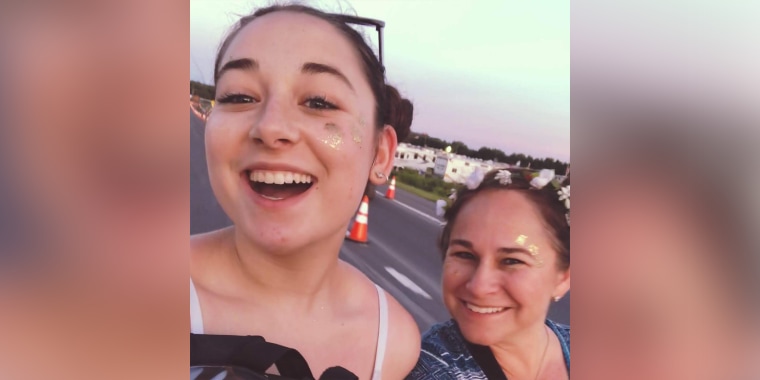Wendy Lipshultz, 48, is a Washington-area mom whose daughter Becca developed anorexia when she was in seventh grade. Becca, who is now 17, lost so much weight that she had to be hospitalized and then spend six weeks at an inpatient eating disorder program. It’s been about five years since she has come home. Lipshultz first shared her family's story with TODAY in 2016 and updated it in 2020 with "a really happy ending."
It’s such a strange disease to get your head around. As a child, Becca never had any food issues. Of my three kids, she was probably my best and most adventurous eater. But at around 12, food and weight became an issue. She started to identify herself as fat.
Before her anorexia started, she weighed around 140 pounds. In a matter of months, she dropped to just under 100 pounds.
It was hell at the time — it almost feels like a different world, a different life. We're in such a healthy place now. She's a senior in high school and applying to colleges. She wants to be a musical theater major and wrote a play about her eating disorder. She's at a completely healthy weight.
Could anything have prevented her eating disorder? I don't know. But here’s what I wish I had known before my daughter developed anorexia:
1. A sudden desire to eat "healthy" can mask a problem.
The first way Becca approached it was that she wanted to be healthier. Of course, as parents, we supported that and thought it was normal adolescent behavior. Then, little by little, eating healthier turned into eliminating more and more foods: fries, pizza, pasta, carbs and desserts. She gave up chicken, steak and then fish.
She started losing weight, but we weren’t really alarmed until she started to be very rigid about meals. She was trying to avoid eating and her portions became smaller and smaller.

2. She may not "look like" an anorexic.
If you looked at her, you wouldn’t say, “Oh, this is an anorexic person.” She started to wear bulkier clothes, sort of the opposite of what you might expect.
We have this conception that anorexics are obsessed with their body and their weight, and they are, but they’re ashamed of their body. There’s no point where they ever feel good about it. They will still see themselves as heavy. In my daughter’s case, she felt her thighs were too big, so she started to dress more covered up.
3. You won't recognize your own child.
Becca became more withdrawn, more introverted. She was always super outgoing, super social, but she was not participating in family activities.
There were a lot of manifestations of the disease I just wasn’t prepared for and one of them was my child lying. At that time, she was eating lunch at school unsupervised. We would ask her, “Did you eat your lunch at school?” Of course we expected that she was, but she was throwing it away and not telling us. It was completely, wholly, look-me-in-the-eye lying.
She was gaming the system. We knew we were in a really bad slide.
4. It’s an eating disorder, but it’s really a mental health disease.
We were naive. This is an outrageously talented, beautiful, incredibly smart girl. She’s our high-performing, super rational, good daughter. We thought, of course we can explain this to her, she’ll see the wisdom and she’ll start eating.
But the way the disorder works in her brain is the more weight you lose, the more you become fearful of food. You become so invested in restricting.
It’s like me saying to you, “Here’s a plate of worms and could you just eat it? What’s the problem?”
5. You may need a wake-up call to turn things around.
When we first enrolled Becca in an intensive outpatient treatment, like a lot of parents, I thought I would give my child to this center and they would “fix her.” I would get her back and everything would be fine.
We didn’t realize at the time that Becca’s disease was 10 steps ahead of us. The first month was OK; she maintained her weight. And then it started to decline.
Our wake-up call came in June 2015. Her doctor said, “You need to just take her to the hospital right now because her heart rate is too low.” Her pulse was in the 50s.
She was instantly put on a feeding tube. The goal is to get enough calories in your body to get your heart rate back to normal. When I spent the night with her at the hospital, her heart rate was setting off the alarms because it was dipping into the 30s. She was in the hospital for a week.
Her going to the hospital, in many ways, was the best thing for all of us. I said, I’ve got to figure this out. I have to save my child. I can’t passively participate. I need to know what’s going on.
It also scared her. All the things we told her could happen, happened. It was a watershed moment for all of us as a family.
6. You'll be shocked how an eating disorder ravages the body.
When you’ve starved your body, it becomes hypermetabolic. It becomes just insane. In the hospital, she was ingesting around 4,500 calories a day with the help of the feeding tube and she only gained 1 pound.
The natural instinct of the body to prevent you from starving is to slow everything down. She stopped having her period.
Many anorexics don’t get enough calcium. You can do irreparable damage to your bones and organs. We were lucky that she doesn’t have bone damage. Her liver enzymes were elevated, which is typical.
7. Parents play a huge role in recovery.
After her hospital stay, Becca was nowhere near her normal weight range, so we decided to put her in a live-in eating disorder program. This is our 13-year-old daughter and we’ve just committed her to essentially a mental hospital for six weeks. That was just devastating.
I started to do my own research and I joined two parent groups that probably carried me through. Hearing from other parents was really beneficial.
On Facebook, I joined two private groups: EDPS (Eating Disorder Parent Support) and MAED (Mothers Against Eating Disorders) — both were incredible. As a more general open group, I really liked Feast.
By the time Becca came home, we decided we wanted her to physically eat no matter how long that took. We were in complete control of what she ate. We plated her food. We measured it. We watched her eat like a hawk, every last bite.
We had pretty self-sufficient kids, but all of a sudden, it was like having a toddler. We were in control of what she ate for at least a year. Then she started to take back control of her eating, which was at first very terrifying. She now eats everything that a normal kid would.
8. You just have to push through the bad times.
We had some of the most bizarre experiences. When she was first home, it would take two hours to eat a tortilla with black beans and tofu or fish. There were tears — it was very tense.
The first time she ate all three meals in a day, I thought she was going to kill herself. It was that horrible for her. But then the next time, it wasn’t. We really just pushed through it.
9. Dealing with anorexia also takes a village.
Becca’s team consisted of a dietitian, a therapist and a family doctor who was a specialist in eating disorders.
Similar to any medical crisis, the doctors aren’t necessarily going to collaborate or share all the information with each other. We did that. We started to get our team on board.
When she went back to school, we arranged for two teachers to eat lunch with her. Otherwise, she might have tried to throw out her food. We would bring her lunch to the nurse, the nurse would give it to the teacher and Becca would eat it. Our school was phenomenal.
10. You have to become a helicopter parent.
Before this, my husband and I weren’t super helicopter parents. But we had to change our parenting style. We really had to ask her: What are you doing? What’s going on? What’s happening? What are you doing in your room?
We told her: If the weight goes down, we’re going to know. She was weighed by her doctor, so there was no room for negotiation. We wanted her to stay in the range of a number.
11. Push for full recovery, not something in between.
We spent so much time and energy working through this — I never would have believed if I haven’t lived through it.
We took a very hard line and very strong control. We didn't settle in between. We pushed for full weight restoration; we pushed for a normal life. It was hell at the time, but if I look at now where I am, I have a beautiful, happy, well-adjusted child.


